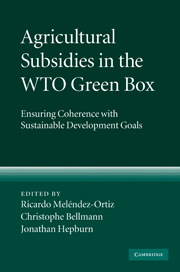Book contents
- Frontmatter
- Contents
- List of contributors
- Preface
- Acknowledgements
- List of abbreviations
- 1 Overview
- PART I The recent evolution of agricultural trade policy reform
- PART II The focus, extent and economic impact of green box subsidies
- PART III Green box subsidies and developing countries
- 11 Agricultural subsidies in the WTO green box: opportunities and challenges for developing countries
- 12 Use of green box measures by developing countries: an assessment
- 13 A Chinese perspective on the green box
- 14 African countries and the green box
- PART IV Green box subsidies and the environment
- PART V Looking forward: how can change take place?
- Appendix: Text of Annex 2 of the WTO Agreement on Agriculture (“the green box”)
- Index
13 - A Chinese perspective on the green box
from PART III - Green box subsidies and developing countries
Published online by Cambridge University Press: 03 May 2010
- Frontmatter
- Contents
- List of contributors
- Preface
- Acknowledgements
- List of abbreviations
- 1 Overview
- PART I The recent evolution of agricultural trade policy reform
- PART II The focus, extent and economic impact of green box subsidies
- PART III Green box subsidies and developing countries
- 11 Agricultural subsidies in the WTO green box: opportunities and challenges for developing countries
- 12 Use of green box measures by developing countries: an assessment
- 13 A Chinese perspective on the green box
- 14 African countries and the green box
- PART IV Green box subsidies and the environment
- PART V Looking forward: how can change take place?
- Appendix: Text of Annex 2 of the WTO Agreement on Agriculture (“the green box”)
- Index
Summary
China is a large agricultural developing country, and its agricultural policy aims at ensuring food security, increasing farmers' income and promoting the harmonious and sustainable development of agriculture, economy and society in rural areas. For a long period of time, instead of being subsidized and supported, the agricultural sector has been “exploited” by agriculture taxes and the difference between the prices of industrial and agricultural products. It has nonetheless made considerable contributions to industrialization and urbanization in the country.
Ever since the founding of the People's Republic of China, significant achievements have been made in the agricultural sector, attracting attention from around the world. These achievements can mainly be attributed to policy and institutional factors, such as land ownership reform and the household contract responsibility system. Scientific and technical innovation and the improvement of farmers' skills and abilities have also played an important role. After the reform and opening-up, the government has been gradually increasing support for the agricultural sector with the growth of financial capacity and the aging of agricultural infrastructure. Support for agricultural production, however, is still very limited, due to the double constraint of weak financial capacity and the commitments made during the country's accession to the WTO. The main support measures are still confined to a few green box measures and support programmes under the coverage of de minimis.
- Type
- Chapter
- Information
- Agricultural Subsidies in the WTO Green BoxEnsuring Coherence with Sustainable Development Goals, pp. 399 - 411Publisher: Cambridge University PressPrint publication year: 2009



